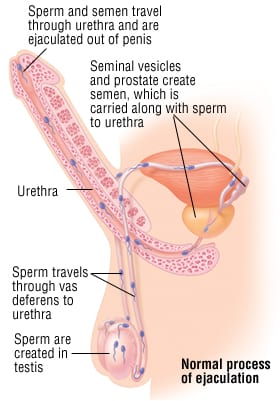In real life, many men face an embarrassing issue that they are reluctant to discuss—premature ejaculation. This phenomenon not only affects sexual satisfaction but can also lead to feelings of inferiority, anxiety, and even aversion to sex. In fact, premature ejaculation is not a major issue that should be stigmatized. It often has underlying causes that can be explained. By understanding these causes and addressing them appropriately, most cases can be improved.
Physiological factors: If your body is not functioning properly, you will naturally ejaculate faster
In many cases, premature ejaculation is not caused by psychological stress or technical issues, but rather by minor physical problems. The most common cause is prostatitis. The prostate is a crucial organ that controls ejaculation. Once inflamed, it becomes sensitive and congested. At this point, even slight stimulation can cause the brain to immediately send an “ejaculation signal,” making it difficult to control.
In addition to prostatitis, another condition called seminal vesiculitis should not be overlooked. The seminal vesicles are where semen is stored. Once inflamed, they can cause pain or discomfort during ejaculation, which can trigger premature ejaculation.
In addition, minor inflammations that don’t sound too serious, such as urethritis and balanitis, can also affect ejaculation control.This is because these inflammations make the nerves in the lower body more sensitive, thereby reducing the brain’s ability to inhibit ejaculation.

It is worth mentioning that some men have a naturally unique distribution of nerves in their genitals, such as too many nerve branches or particularly sensitive nerves. This type of person is prone to reaching orgasm quickly under sexual stimulation, and even with extensive sexual experience, it is difficult for them to prolong the duration. This type of situation is generally stubborn and may not be completely improved even with medication.
Endocrine issues: Hormone levels can also affect “speed”
In addition to organ-related issues, hormone levels in the body may also be quietly “causing trouble.” For example, abnormal levels of male hormones can affect a man’s sex drive, erectile function, and ejaculation control. If you often experience fluctuations in your sex drive, easily become aroused but have difficulty maintaining it, it may be related to hormone fluctuations in your body.
Another factor is thyroid dysfunction. If the thyroid is overactive or underactive, it can interfere with the body’s entire hormone system, especially the nervous system’s ability to regulate the ejaculation reflex. As a result, before you are ready, your brain has already “pressed fast forward.”
Psychological pressure: the more you fear “being too fast,” the more likely you are to “be too fast”
Sex is, after all, a “mind-body” activity. Many men who ejaculate quickly actually have more psychological issues.
For example, some people are too tense and anxious during sex, always worrying about their performance, afraid that their partner will be disappointed, or afraid that they “can’t perform.” This anxiety makes the brain very sensitive and even overly reactive, so that even the slightest sexual stimulation can cause extreme excitement and loss of control.
Especially during the first sexual experience, with a new partner, or in an unfamiliar environment, many men feel a lot of pressure, making it even more likely for them to experience premature ejaculation.
Some men who have been in a bad mood for a long time, such as those with mild depression, may also experience premature ejaculation. This is because depression can lead to insufficient secretion of a substance called serotonin in the brain, which is a key neurotransmitter that helps delay ejaculation. When serotonin is deficient, the brain’s ability to inhibit ejaculation naturally decreases.
Poor lifestyle habits may also be “harming you”
In addition to physical and psychological issues, our daily habits can also silently affect ejaculation time.
For example, long-term sleep deprivation can disrupt the biological clock, causing hormonal imbalances and making the nervous system more sensitive, so that even slight stimulation can cause ejaculation.
Another example is excessive smoking and drinking, which can damage blood circulation and nerve function, affecting the health of the sexual organs and reducing ejaculation control.
Another easily overlooked issue is frequent exposure to pornographic content or excessive masturbation. These behaviors can cause the brain to gradually form a habit of “quick ejaculation,” causing you to unconsciously rush to finish as soon as you feel sexual stimulation. Over time, even during actual sexual intercourse, you will unconsciously speed up the pace and find it difficult to maintain endurance.
Summary:
Premature ejaculation is not an insurmountable problem. The key is to first identify the underlying cause—whether it stems from physiological issues, psychological factors, or lifestyle habits. Only by addressing the root cause can effective improvements be made. If you consistently feel unable to control it, it is advisable to seek medical consultation promptly, as some issues become harder to resolve the longer they are left untreated.
Additionally, it is important to maintain a positive mindset and avoid feeling anxious or discouraged when things happen quickly. Sexual intimacy is a shared experience between two people, and communication and understanding are equally important. Taking care of your physical health, maintaining a regular schedule, and reducing stress are the keys to enhancing sexual well-being in the long term.

